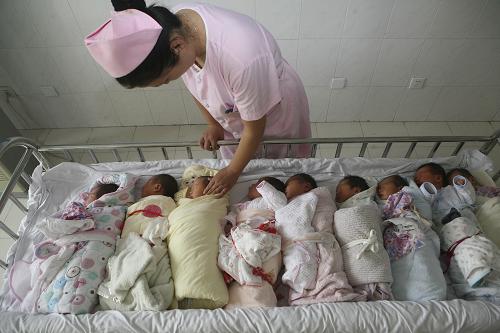Population vitality comes from open policies
- By Mu Guangzong
 0 Comment(s)
0 Comment(s) Print
Print E-mail China.org.cn, October 3, 2014
E-mail China.org.cn, October 3, 2014
Population development in big cities needs to be carefully considered when dealing with the overall national population. In fact, urban population control is an issue of urban management and social development which must be included in any overall government plan on population.
|
|
|
As China changes the way it handles population control, the government needs to situate these reforms within a broader context of national socio-economic development. |
One of the most prominent population phenomena in China since reform and opening-up policy was implemented in 1978 is the unprecedented floating population of rural migrants, rising from 70 million in 1993 to 140 million in 2003, and accounting for about 30 percent of the rural labor force.
The fifth national census in 2000 showed that 65 percent of these migrants moved to somewhere within their own region or province, while 35 percent traveled further afield. Young people formed an overwhelming majority of this population - 80 percent of migrants are between 15 and 35 years of age.
The floating population reached 236 million in 2012, meaning that one in every six people in China was a migrant. The average age for a migrant was about 28, and more than half of the migrant workforce was born after 1980. Surveys showed that about 75 percent of the floating population had begun hunting for city jobs before reaching the age of 20, and 70 percent hoped to stay and live in big cities long-term.
The characteristics of the migrant population can be summarized as follows:
There has been a rapid increase of migrants to developed areas; the majority of the migrant population is below the age of 40; it is dominated by manual laborers; migrants tend to live in dormitories, sheds, rented houses, or the homes of relatives and friends; and the majority in any city tend to come from neighboring areas.
The main problems presented by the large migrant population can be distilled into three points. First, the migrant population has a weak sense of law and order, with migrants perpetrating 80 percent of all crimes. Second, the proportion of migrant women of childbearing age is high, and many are affected by reproductive health problems. Third, migrant travel imposes great pressure on urban public transportation.
All these aspects tend to have both positive and negative sides. Migrants have made an indelible contribution to the expansion of urban economic development. In China's market economy, cities benefit from population mobility, and a floating population entering from all directions invigorates city life. We can take Beijing as an example. Without migrants' contributions, the capital would enjoy little prosperity. The municipal government's efforts to heighten requirements for migrants violate the spirit of tolerance.






